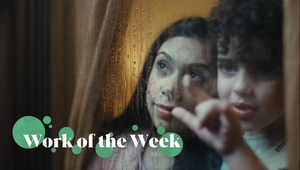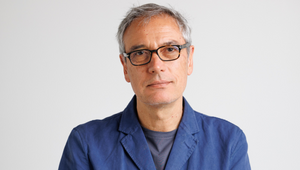
Bossing It: René Migliore: "I believe all aspects of ‘leadership’ should be a natural part of personality"

With over 25 years experience in advertising and media, René Migliore finds himself as managing director of 303 MullenLowe Perth. Previous to this role, he was account manager for DDB Melbourne, The Brand Agency and communications planning director at Initiative
As managing director at 303 MullenLowe Perth, René oversees the entire creative agency. His passion for all things creative, media and business is evident in everything he does.
René has worked with global and local brands such as Mobil, Bunnings Warehouse, BankWest, IKEA, Cash Converters, Australia Post, Red Rooster, BRW, Synergy and Seek.com.au.
LBB> What was your first experience of leadership?
René> It was probably when I first started out in the industry and the AFA was looking to stand-up the Youngbloods in WA (circa late 90’s when I thought Friends was a reality show).
My boss at the time, the irrepressible Debra Shorter, was the WA representative on the national AFA board and she asked if I wanted to get the initiative up-and-running. I was a plucky Account Coordinator at the time. After assembling a team of about 8 ‘youngbloods’ from agencies across Perth, the inaugural committee was formed, and we set about organising our first event. Over the course of a few meetings, I found myself being looked at for key decisions and before long I was asked by my peers to be chair.
None of us really knew what the playbook was, we were forming something new, making decisions pretty quickly and basically making it up as we went…perhaps I was just the best at faking it?
LBB> How did you figure out what kind of leader you wanted to be – or what kind of leader you didn’t want to be?
René> I’ve never made a conscious decision to be a particular kind of leader, I’m only ever me.
Certainly, I’ve never liked being a ‘boss’, it’s not a term I ever used through my career and it’s not really part of my vernacular now – although I certainly have a boss!
I try to make decisions based on my own experience, intuition, and nature – without subscribing to a particular ‘kind’ of leadership. If I was to categorise it, I hope I lead from behind, by supporting the team around me. And always try to put myself in their shoes and think about how decisions will affect them.
Afterall I’ve spent much more time in my career looking to leaders rather than being one.
LBB> What experience or moment gave you your biggest lesson in leadership?
René> Crises always provide the greatest opportunity for leadership lessons, or life lessons (is there difference?!). Like anyone in a leadership position I’ve experienced my fair share in life and business.
Typically, a crisis is an unexpected change, and you know how we all love change! I could name a bunch of examples that all relate to managing unexpected change; staff leaving, clients leaving, new clients joining, ownership change or culture changes. My most significant and memorable moments are personal, like losing my Mum. The common thread in all those moments of crisis is learning to take a beat. Stop, process what things you have the power change and what you don’t, then act accordingly.
LBB> Did you know you always wanted to take on a leadership role? If so how did you work towards it and if not, when did you start realising that you had it in you?
René> No, I didn’t always want to take on a leadership role. In fact, I was quite happy developing my experience and skill set working closely with clients and immersing myself in the work, rather than dealing with management responsibilities. I did, however, always have an inherent desire to be valuable and make a meaningful impact, both for the agency and clients. Being in that role exposed me to the entire agency’s operations, allowing me to swiftly grasp how things worked. It taught me the art of quickly building relationships and honing my problem-solving skills. Additionally, I gained early experience in handling difficult conversations. While I may not have been the ultimate decision-maker, I served as the messenger and mediator. Afterall, as Traffic Manager I had to manage expectations of each department – I was doing my job well when everyone was happy (or at least not, unhappy).
The negotiation skills and resilience under pressure earned in that role are still part of who I am now professionally.
In my first role as a senior account manager, I oversaw a significant retail client and managed a team of four.
Suddenly, my responsibilities expanded beyond client engagement to include problem-solving and people management. This role was a pivotal moment, as it marked a shift from being managed to taking charge. It served as an excellent training ground, allowing me to put those old traffic manager skills to work. I had to start making decisions and taking ownership of their outcomes. Looking back, during my 5-years at that agency, honing my leadership skills, despite being too damn busy to stop and think about it.
LBB> When it comes to ‘leadership’ as a skill, how much do you think is a natural part of personality, how much can be taught and learned?
René> I believe all aspects of ‘leadership’ should be a natural part of personality. The learned behaviour still needs to be true to you as a person. I try to pick up positive leadership behaviours from my mentors and leaders but then I try look for ways to implement those learned behaviours in my own way. So yes, you’re always going to learn new skills and behaviours as a leader, but I think if they’re executed in a way that’s not true to you as an individual, your team will see right through it. Being genuine is critical – for better or worse.
LBB> What are the aspects of leadership that you find most personally challenging? And how do you work through them?
René> Not surprising the ‘tough conversations’ are obviously the most challenging. When business decisions have a human impact. Whether that’s managing a performance issue, addressing a cultural or behaviour issue or having to make the tough call to let someone go…they never get easier.
LBB> Have you ever felt like you’ve failed whilst in charge? How did you address the issue and what did you learn from it?
René> Only all the time. Every missed opportunity, every pitch loss, every missed budget feels like a personal failure. Of course, I try to remind myself that I’m just one individual and that it take all of the business to contribute to the failures just as it does for the wins. But I still always feel responsible.
I guess that’s the motivation. Not wanting to let the business or the team down is what drives me. So I try to own the failures, to understand them and of course find the lessons before shaking them off and moving on. Being a martyr is not helpful to anyone in the business!
LBB> In terms of leadership and openness, what’s your approach there? Do you think it’s important to be transparent as possible in the service of being authentic? Or is there a value in being careful and considered?
René> You have to do both. Obviously commercially sensitive and personal information aside, I try to be as transparent as possible. Holding onto information and being selective about what is shared and to whom, leads to a toxic situation. It creates a vacuum of information, which gets filled with gossip, then info becomes a currency. Sharing information and news freely is a way to take away the ‘value’.
Equally, I’ve always found that sharing too much too quickly can backfire. Situations can evolve quickly in this game so what makes sense one day, can flip the next. So being considered and taking a beat as I mentioned earlier, tends to lead to better decisions.
My hope is that the agency leadership team and I, have created a culture that’s open, allows for transparency and trust – a safe space for grown up conversations, good bad or just conversations.
LBB> As you developed your leadership skills did you have a mentor, if so who were/are they and what have you learned? And on the flip side, do you mentor any aspiring leaders and how do you approach that relationship?
René> I have a few trusted friends and family I confide in rather than one specific mentor. Getting diverse points of view and experiences helps to put things in perspective. The lessons are always the same however; you’re not alone, any challenge you face has been faced before by someone else. So share, vent your frustrations. You’ll always get some valuable advice and, you’ll feel better for getting it off your chest.
I’m not a mentor at the moment but I do try to support and nurture new and emerging talent, particularly through my involvement with the Advertising Council. In the past, I contributed to the creation of the program that eventually became Jumpstart. At the time, we were finding that many university graduates lacked visibility into the inner workings and responsibilities within creative and media agencies. So the WA ACA lead and I developed a new foundations course. The program exposed participants to multiple agencies, and they had the opportunity to learn from practitioners across the spectrum of agency services. This hands-on experience helped participants gain a clearer understanding of their desired roles and the steps they needed to take to achieve their goals.
LBB> It’s been a really challenging year - and that’s an understatement. How do you cope with the responsibility of leading a team through such difficult waters?
René> Indeed, and we’ve had some added challenges in our business with some key staff changes. It’s tough going but surrounding yourself with good people is critical. We remind each other of the collective mission, we lift each other up when we need to, and we share the losses as much as the wins.
Trying to remember that sweating the things you can’t control is pointless, and reward comes from putting sweat into the things you can control. Keeping the team informed (as talked about earlier) is also key, so we limit surprises as much as possible and everyone knows their part, as well as managements’ part.
LBB> What are the most useful resources you’ve found to help you along your leadership journey?
René> Mainly wine.
I’m only half joking. Wine, shared with friends and colleagues and good conversation has always been a hugely valuable exercise. And generally recognising that your network of friendships and working relationships over many years, is the most valuable resource you can have. In a town as small as Perth it always pays to respect every relationship and see the best in people. You never know when you’ll work with them again.















